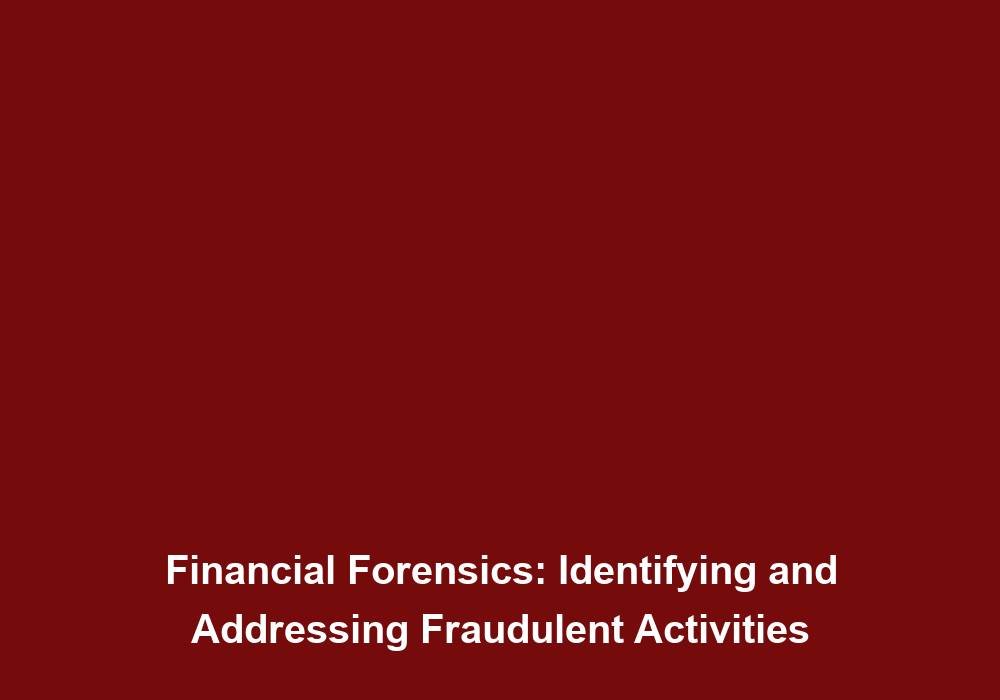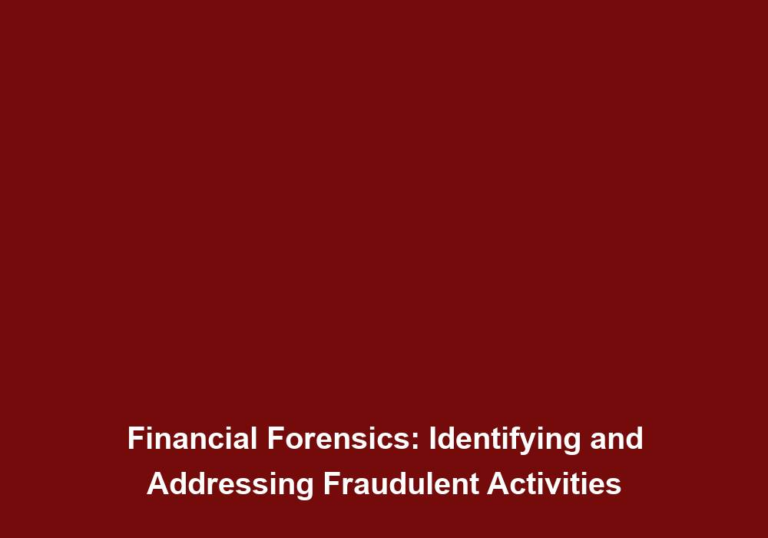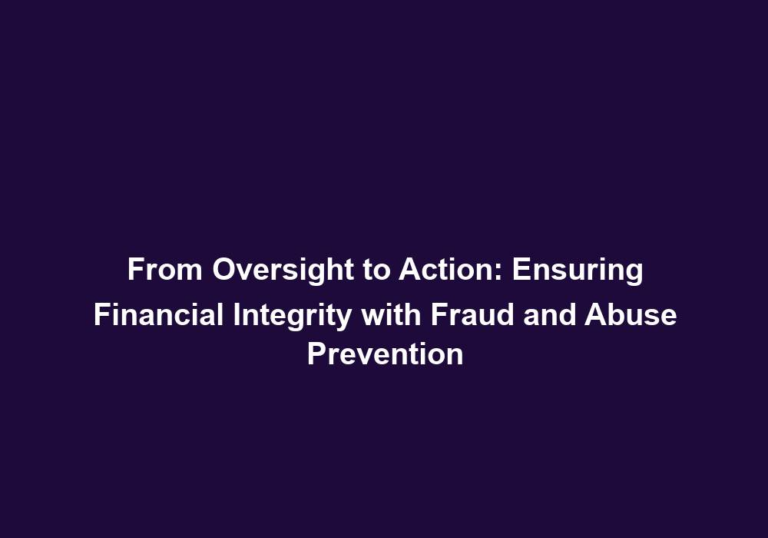Financial Forensics: Identifying and Addressing Fraudulent Activities
Financial fraud has become a growing concern in today’s complex and interconnected business landscape. Companies face various risks, including internal and external fraud, money laundering, and unethical financial practices. To mitigate these risks and maintain stakeholders’ trust, organizations need to understand the importance of financial forensics. This article will delve into the world of financial forensics, exploring its key principles, methodologies, and tools.
What is Financial Forensics?
Financial forensics, also known as forensic accounting or forensic audit, is the application of investigative techniques to analyze financial records and transactions. Its primary objective is to identify and uncover fraudulent activities, misrepresentations, and financial irregularities. By employing a combination of accounting skills, auditing techniques, and legal knowledge, financial forensics experts play a vital role in ensuring the integrity and transparency of financial information.
Financial forensics involves analyzing financial data and conducting thorough investigations to identify red flags and patterns that may indicate fraudulent activities. By examining financial records and transactions, forensic accountants can uncover evidence of asset misappropriation, financial statement fraud, money laundering, bribery, and corruption.
Asset Misappropriation
Asset misappropriation refers to instances where employees misuse company resources or steal assets. Financial forensics can help identify unauthorized transactions, embezzlement, and fraudulent expense claims. By analyzing financial data and conducting investigations, forensic accountants can trace the flow of funds and uncover evidence of asset misappropriation. This includes identifying unauthorized transactions, tracking suspicious activities, and gathering evidence to support legal action.
Financial Statement Fraud
Fraudulent financial reporting involves intentional misrepresentation or manipulation of financial statements. Financial forensics can uncover irregularities, such as fictitious revenues, hidden liabilities, or inflated assets. Forensic accountants analyze financial statements, examine supporting documents, and perform data analysis to identify inconsistencies and patterns that may indicate financial statement fraud. By conducting thorough investigations, they can gather evidence to support legal proceedings and hold responsible parties accountable.
Money Laundering
Financial forensics plays a crucial role in identifying and tracking money laundering activities. By analyzing transaction patterns and following the money trail, forensic accountants can assist law enforcement agencies in combating this illegal practice. Through data analysis, document examination, and interviews, forensic accountants can identify suspicious transactions, hidden accounts, and complex money laundering schemes. By providing evidence and expert testimony, they contribute to the successful prosecution of money laundering cases.
Bribery and Corruption
Financial forensics can help uncover instances of bribery, corruption, and unethical business practices. Through detailed investigations, forensic accountants can identify suspicious payments, irregular transactions, and conflicts of interest. By analyzing financial records, conducting interviews, and utilizing forensic technology, they can trace the flow of funds, identify individuals involved in bribery and corruption, and gather evidence to support legal actions. This helps organizations combat bribery and corruption, ensuring fair and ethical business practices.
Methodologies and Techniques Used in Financial Forensics
Financial forensics employs various methodologies and techniques to uncover fraudulent activities. These approaches include data analysis, document examination, interviews and interrogations, and the use of forensic technology.
Data Analysis
Financial forensics relies heavily on data analysis techniques to identify anomalies and patterns that may point to fraud. Advanced software tools enable forensic accountants to scrutinize large volumes of financial data efficiently. By analyzing transactions, account balances, and other financial data, forensic accountants can identify suspicious activities, trends, and patterns that may indicate fraudulent activities. Data analysis helps uncover hidden relationships, unusual transactions, and discrepancies that may otherwise go unnoticed.
Document Examination
Document examination involves reviewing and scrutinizing financial documents, such as invoices, receipts, and contracts. Forensic accountants meticulously analyze these documents to identify inconsistencies, forgeries, or altered records. By comparing signatures, examining handwriting, and analyzing document content, forensic accountants can uncover evidence of fraudulent activities. Document examination plays a crucial role in detecting financial statement fraud, asset misappropriation, and other fraudulent practices.
Interviews and Interrogations
Forensic accountants often conduct interviews with individuals involved in financial transactions to gather information and uncover potential fraud. These interviews may be conducted with employees, clients, or third-party individuals connected to the case. By asking targeted questions and analyzing responses, forensic accountants can uncover hidden information, identify inconsistencies, and obtain valuable evidence. Interviews and interrogations help build a comprehensive understanding of the case and provide insights into fraudulent activities.
Forensic Technology
Rapid advancements in technology have revolutionized financial forensics. Forensic accountants use specialized software tools to extract and analyze electronic data, including emails, financial transactions, and social media posts. By utilizing forensic technology, forensic accountants can uncover digital evidence, trace the flow of funds, and identify fraudulent activities that may be hidden in electronic records. Forensic technology enhances the efficiency and effectiveness of financial investigations, enabling forensic accountants to uncover complex fraud schemes.
The Importance of Financial Forensics in Business
Financial forensics serves as a critical component of a company’s risk management strategy. Here are some reasons why businesses should prioritize financial forensics:
Fraud Detection and Prevention
Financial forensics helps detect and prevent fraudulent activities, safeguarding a company’s assets and reputation. By identifying vulnerabilities and implementing robust internal controls, organizations can minimize the risk of fraud. Financial forensics enables early detection of red flags, allowing businesses to take prompt action and prevent potential losses. Through continuous monitoring and analysis, forensic accountants can help organizations stay one step ahead of fraudsters.
Legal Compliance
Financial forensics ensures that businesses adhere to legal and regulatory requirements. It helps organizations detect non-compliance issues, such as fraudulent financial reporting or money laundering, allowing timely corrective actions. By conducting thorough investigations, forensic accountants can gather evidence to support legal proceedings and ensure that businesses comply with applicable laws and regulations. Compliance with legal requirements is crucial for maintaining the trust and confidence of stakeholders.
Dispute Resolution
Financial disputes often require expert analysis and investigation. Financial forensics provides objective and impartial insights that can help resolve disputes related to fraud, business valuation, or breach of contract. By analyzing financial records, conducting interviews, and utilizing forensic techniques, forensic accountants can uncover the truth behind complex financial disputes. Their expertise and findings can contribute to fair and equitable dispute resolution, saving businesses time, money, and reputation.
Recovery of Lost Assets
In cases where fraud has occurred, financial forensics can aid in asset recovery. By tracing the flow of funds and identifying hidden assets, forensic accountants assist in recovering stolen or embezzled funds. Through detailed investigations and collaboration with law enforcement agencies, forensic accountants can follow the money trail and uncover assets that have been fraudulently acquired or concealed. Asset recovery not only compensates the victims but also sends a strong message that fraudsters will be held accountable.
Conclusion
Financial forensics plays a vital role in identifying and addressing fraudulent activities, ensuring the integrity of financial information, and maintaining stakeholders’ trust. By employing various methodologies and techniques, forensic accountants can detect red flags, investigate suspicious transactions, and provide valuable insights to businesses. Prioritizing financial forensics helps organizations mitigate risks, comply with legal requirements, and safeguard their assets. In an increasingly complex and interconnected business environment, financial forensics has emerged as an indispensable tool for fraud detection and prevention.







